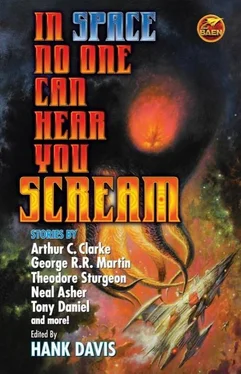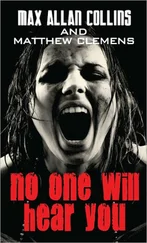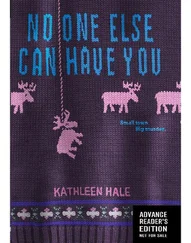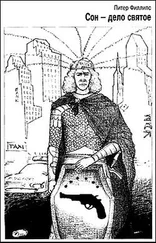Питер Филлипс - In Space No One Can Hear You Scream
Здесь есть возможность читать онлайн «Питер Филлипс - In Space No One Can Hear You Scream» весь текст электронной книги совершенно бесплатно (целиком полную версию без сокращений). В некоторых случаях можно слушать аудио, скачать через торрент в формате fb2 и присутствует краткое содержание. Город: Riverdale, NY, Год выпуска: 2013, ISBN: 2013, Издательство: Baen Books, Жанр: Фантастика и фэнтези, на английском языке. Описание произведения, (предисловие) а так же отзывы посетителей доступны на портале библиотеки ЛибКат.
- Название:In Space No One Can Hear You Scream
- Автор:
- Издательство:Baen Books
- Жанр:
- Год:2013
- Город:Riverdale, NY
- ISBN:978-1-4516-3941-4
- Рейтинг книги:4 / 5. Голосов: 1
-
Избранное:Добавить в избранное
- Отзывы:
-
Ваша оценка:
- 80
- 1
- 2
- 3
- 4
- 5
In Space No One Can Hear You Scream: краткое содержание, описание и аннотация
Предлагаем к чтению аннотацию, описание, краткое содержание или предисловие (зависит от того, что написал сам автор книги «In Space No One Can Hear You Scream»). Если вы не нашли необходимую информацию о книге — напишите в комментариях, мы постараемся отыскать её.
In Space No One Can Hear You Scream — читать онлайн бесплатно полную книгу (весь текст) целиком
Ниже представлен текст книги, разбитый по страницам. Система сохранения места последней прочитанной страницы, позволяет с удобством читать онлайн бесплатно книгу «In Space No One Can Hear You Scream», без необходимости каждый раз заново искать на чём Вы остановились. Поставьте закладку, и сможете в любой момент перейти на страницу, на которой закончили чтение.
Интервал:
Закладка:
In Space No One Can Hear You Scream


This one is for my brother, Charles Richard Davis,
known to some as Richard, and to others as Charles,
with whom I watched Shock Theater on Saturday nights
in the late 1950s. Golden hours.
ACKNOWLEDGEMENTS
My thanks to all the contributors, as well as those who helped with advice, permissions, email addresses, and other kindnesses, including Andrew and Ann Dibben, Noel Sturgeon, William Dorman, Moshe Feder, David Drake, Barry Malzberg, Chris Lotts, Ann Behar, Russell Galen, Cameron McClure, Katie Shea, Kay McCauley, Ellen Datlow, Bud Webster, Nicholas Steers, and Christopher Cifani. And to Toni Weisskopf, whose idea the whole thing was, including the title.
INTRODUCTION:
It’s DARK BETWEEN THE STARS
So, you’re here to be scared, eh? No evasions, now. You saw the title. You saw the cover. You read the back cover copy. You knew this book was scary when you bought it. You didn’t come in here just to get out of the rain. No fair claiming intellectual curiosity, even if you’re in grad school and desperate for a thesis topic. You wanted to come in and get scared. Never mind that afterwards you’ll leave, looking over your shoulder on the way home—did something move in the shadows over there?—twitching at odd noises, noticing for the first time how dark it is between those unsettlingly wide spaced streetlights (the ones that aren’t burned out, that is), and of course when you walk home, it’ll be long after dark. The whole nine scary yards.
So why are you spending time reading this introduction, then. Introductions aren’t scary (though they may border on violence—hi, Harlan®). You should go right to the stories, without delay. Well, after you make sure all the doors are locked, all the lights are on, and there’s nothing hiding under the bed or in any of the closets. (Yes, I know I just had you outdoors, walking home in the dark—this is an introduction and doesn’t require rigorous consistency of scene, so there!) Then (did you look in all the closets?), you should go right to the stories.
Still here? An unkind person might think you were a bit scared of reading the stories. And I may be an editor, a contemptible breed known for being as lacking in kindness as lawyers, insurance executives, politicians, journalists, and other such bottom-feeders, but I’d never accuse one of the readers who pays perfectly good money for books of being scared. You haven’t read the stories yet—how could you already be scared? (Of course, there was that cover on the book . . .) You’re just not in the mood, probably. So let’s sit here (yes, all the doors are locked—just ignore that scrabbling at the door as if something wants in—and all the lights are on, and this is an imaginary room with no closets for things to hide in) and have a relaxed discussion about science fiction and horror stories. They’re not necessarily the same thing, you know, though some people seem to think so.
In fact, I’ve long been puzzled by how many people think science fiction is scary . . . These are mostly people who don’t read science fiction, of course. The idea isn’t so much wrong, as very incomplete, like other general notions the mass mind has about science fiction, such as that all science fiction is set in space or in the future, or involves dystopias or post-apocalyptic worlds . . . or is intended to frighten. But some of it is intended to frighten, and here’s a book full of tales by top writers who definitely intend to disturb your equanimity. (Are you sure you wouldn’t rather be reading those nifty spine-chillers than listening to me drone on? But it’s your choice.)
A friend of mine in college, who had observed my habit of consuming sf by the bushel, once mentioned that she didn’t read it because she didn’t want to be frightened. As it happens, she had been pushing me to read Agatha Christie, and I thought I’d expand her horizons by getting her to read the absolutely non-scary Beyond This Horizon by the Master, himself, Robert A. Heinlein (currently available from Baen Books, incidentally). In return I’d read one of Hercule Poirot’s exploits. I held up my part of the deal, but she wimped out on her end, and as far as I know (haven’t seen her in decades) she may still think sf is scary. (Maybe I shouldn’t have mentioned to her how underwhelming I found Christie in comparison with Rex Stout, Raymond Chandler, or Leslie Charteris, but that’s an introduction for a different book.) And her attitude was typical of a lot of people.
There might be a number of reasons for that. One might be the science fiction comic books of the 1950s (before the half-wit comedy team of Wertham and Kefauver ruined everything), which often had sf stories with a horror slant. Weird Science and Weird Fantasy from EC comics were a prime example, and probably the best done.
A more pervasive influence was in the many science fiction movies of the 1950s which were also horror movies. Destination Moon and The Thing from Another World debuted close together, but I think the latter movie stuck in people’s minds more than the Heinlein-Pal flick. Before long, for every movie like The Day the Earth Stood Still , which certainly was not a horror movie (even if the alien robot Gort gets a bit scary in spots if you don’t say the code words), there were several sf-horror hybrids, such as Invasion of the Body Snatchers or The Creeping Unknown (originally titled The Quatermass Xperiment in England), along with a veritable deluge of giant ants, giant grasshoppers, giant leeches, giant snails (in The Monster That Challenged the World , featuring the inimitable Hans Conreid, though he wasn’t playing one of the snails), plus regular-sized or larger dinosaurs, as in The Land Unknown , The Beast from 20,000 Fathoms (which bore little resemblance to “The Foghorn,” the Ray Bradbury story that “inspired” it) and the ever-popular Godzilla (or Gojira , as the big guy is called on his home turf—did you know that Godzilla has a star on the Hollywood Walk of Fame?).
Some of these were very good (the Body Snatchers and Quatermass movies in particular), and some weren’t (the giant grasshopper and giant leech flicks, also in particular), but they all gave the typical movie-goer, who, also typically, wasn’t reading the sf books and magazines of the time, the impression that science fiction equals horror.
Even sf movies which weren’t constructed as horror often had monsters obligatto, such as a one-eyed amorphous blob in It Came from Outer Space (another flick indebted to Ray Bradbury, who had wanted the aliens to remain unseen, ala Val Lewton’s Cat People ), This Island Earth . with insect-like humanoids, and The Incredible Shrinking Man , with a regular-sized spider menacing a microscopic hero. Other movies felt the need to take a supernatural staple of horror movies and add a shaky science fictional rationale, as was done with two werewolf movies; though of the two only I Was a Teenage Werewolf is still remembered.
Nowadays, people are (I hope) more likely to think of science fiction in terms of Star Trek and Star Wars , which aren’t frightening (unless you have a phobia for pointed ears or loud breathing). Since both franchises are more like written science fiction, or at least the written sf of the 1940s and 1950s, than the cinematic variety, the masses (who, remember, read little or no sf) may no longer conflate science fiction with horror. But on the other hand, I’ve noticed that a lot of people think of The Twilight Zone (the original) as scary, apparently because of a few episodes which were (“Nightmare at 20,000 Feet” for one, from a story by the late, great Richard Matheson). The wife of a friend of mine will not watch reruns of the show because she thinks it’s scary, and mentions “Nightmare at 20,000 Feet,” as a case in point. Even though very few installments of The Twilight Zone could be called scary, the attitude is widespread: check out the opening of the seriously flawed Spielberg movie clumsily based on the TV show. And then, there’s Alien and its sequels.
Читать дальшеИнтервал:
Закладка:
Похожие книги на «In Space No One Can Hear You Scream»
Представляем Вашему вниманию похожие книги на «In Space No One Can Hear You Scream» списком для выбора. Мы отобрали схожую по названию и смыслу литературу в надежде предоставить читателям больше вариантов отыскать новые, интересные, ещё непрочитанные произведения.
Обсуждение, отзывы о книге «In Space No One Can Hear You Scream» и просто собственные мнения читателей. Оставьте ваши комментарии, напишите, что Вы думаете о произведении, его смысле или главных героях. Укажите что конкретно понравилось, а что нет, и почему Вы так считаете.









